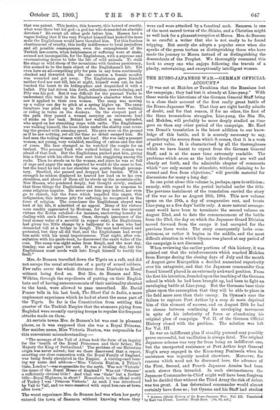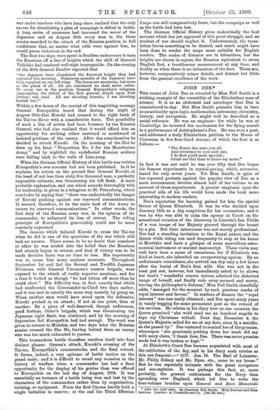THE H1JSSO-JAPAVESE WAR.—G-ERMAN OFFICIAL ACCOUNT.* "Pr was not at Mukden
or Tsushima that the Russians lost the campaign ; they had lost it already at Liao-yang." With these words the historians of the German General Staff bring to a close their account of the first really great battle of the Russo-Japanese War. That they are right hardly admits of doubt, and for that reason, if for no other, the first of the three tremendous struggles, Liao-yang, the Sba Ho, and Mukden, will probably be more deeply studied as time goes on than any other period of the campaign. Mr. Karl von Donut's translation is the latest addition to our know- ledge of this battle, and it is scarcely necessary to say, considering the source from which it comes, that it is a work of great value. It is characterised by all the thoroughness which we have learnt to expect from the German General Staff, and is at the same time extremely readable. The problems which arose as the battle developed are well and clearly set forth, and the admirable chapter of comments which "are only meant to stimulate, without claiming to be correct and free from objections," will provide material for discussions for many a long day.
In one point alone this volume is, perhaps, open to criticism ; namely, with regard to the period included under the title. The previous instalment of the translation carried the story of the war as far as August 28th, 1904. This new volume opens on the 29th, a day of comparative rest, and treats Liao-yang as a five days' battle only. A more natural arrange- ment would have been to terminate the second volume on August 22nd, and to date the commencement of the battle from the 23rd, the day on which the Japanese Guard Division moved forward from the camps it had occupied for the previous three weeks. The story consequently lacks com- pleteness, or rather it begins in the middle, and the most difficult situation in which Oyama was placed at any period of the campaign is not discussed.
When reviewing the earlier portions of this history, it was pointed out that the reinforcements which reached Mukden from Europe during the closing days of July and the month of August gave Kuropatkin a decided numerical superiority over his antagonist, and that the Japanese commander then found himself placed in an extremely awkward position. From the first his intention, founded upon the teaching of the German school in which he had been brought up, had been to fight an enveloping battle at Liao-yang. But the Germans base their plans upon the assumption that they will be able to place in the field more men than their enemy. In Oyama's case the failure to capture Port Arthur by a coup de main deprived him of this element of success, and on August 29th he had to choose between continuing his enveloping movement in spite of his inferiority of force or abandoning his original plan of campaign. 'Vol. II. of the German Official History closed with the problem. The solution was left for Vol. III.
In war an indifferent plan if steadily pursued may possibly prove successful, but vacillation is always fatal. The original Japanese scheme was very far from being an indifferent one,
but the unexpected resistance at -Port Arthur kept General Nogi's army engaged in the Kuan-tung Peninsula when its assistance was urgeutly needed elsewhere. Moreover, for reasons which need not be discussed here, the advance of the 'First, Second, and Fourth Japanese Armies had been much slower -than intended. In such circumstances the Japanese' Commander-is-Chief might well have been 'forgiven had he decided that without the Third Army the risk of defeat was too great. A less determined commander would almost certainly have done so ; but Oyama and his Staff had studiet • German Official History of the Russo-Jopaetase War. Vol. ILE. Translate& by Bari von Donat. London: Hugh Bees. [10s. 6d. net.]
war under teachers who have long since realised that the only excuse for abandoning a plan of campaign is defeat in battle.
A long series of successes had increased the moral of the Japanese, and on August 30th every man in the three armies marched to the attack of the Russian position in full confidence that, no matter -what odds were against him, he would prove victorious in the end.
The first two days were spent in fruitless endeavours to turn the Russians off a line of heights which the skill of General Velichko had rendered well-nigh impregnable. On the evening of the 30th General Danilov reported that
"the Japanese have abandoned the foremost height they had captured this morning. Numerous assaults of the Japanese have been repulsed on our left wing. The losses are enormous, but more so the pluck of all. All are convinced we shall never retire. To every one in the position General Kuropatkin's telegram [announcing the defeat of the first general attack upon Port Arthur] was read. All are shouting hurrah; I am shouting hurrah too !"
Within a few hours of the receipt of this inspiriting message General Kuropatkin heard that during the night of August 30th-31st Kuroki had crossed to the right bank of the Tai-tze River with a considerable force. The possibility of such a line of action had been foreseen by the Russian General, who had also realised that it would afford him an opportunity for striking either eastward or southward at isolated portions of the enemy. After due consideration he decided to attack Kuroki. On the morning of the 31st he drew up his fatal "Disposition No. 3 for the Manchurian Army," and by nightfall the undefeated Russian soldiers were falling hack to the walls of Liao-yang.
When the German Official History of this battle was written Kuropatkin's own account had not been published. In it he explains his action on the ground that General Kuroki, at the head of not less than sixty-five thousand men, a perfectly impossible estimate, was threatening his left flank. A more probable explanation, and one which accords thoroughly with his leadership, is given in a telegram to St. Petersburg, which concludes by saying that "there was undoubtedly the danger of Kuroki pushing against our rearward communications. It seemed, therefore, to be the main task of the Army to secure its rearward communications." In other words, the first duty of the Russian army was, in the opinion of its commander, to safeguard its line of retreat. The ruling principle of Kuropatkin's generalship could not be more concisely expressed.
The reasons which induced Kuroki to cross the Tai-tze when he did is one of the questions of the war which still lack an answer. There seems to be no doubt that somehow or other he was misled into the belief that the Russians had already begun to retreat, and that if victory was to be made decisive there was no time to lose. His impetuosity was to cause him many anxious moments. Throughout September let and 2nd the Second and Twelfth Japanese Divisions, with General 1Jmezawa's reserve brigade, were exposed to the attack of vastly superior numbers, and for a time it looked as though "he had bitten off more than he could chew." His difficulty was, in fact, exactly that which had confronted the Commander-in-Chief two days earlier; and it was met in exactly the same way, namely, by going on. When another man would have stood upon the defensive, Kuroki pushed in an attack ; if not at one point, then at another. By a piece of well-deserved, though unforeseen, good fortune, Orlov's brigade, which was threatening the Japanese right flank, was shattered, and by the morning of September 3rd Kuropatkin had had enough. The word was given to retreat to Mukden, and two days later the Russian armies crossed the Sha Ho, leaving behind them an enemy who was too much exhausted to pursue.
This tremendous battle therefore resolves itself into four distinct phases: Oyama's attack, Kuroki's crossing of the Tai-tze, Kuropatkin's counterstroke, and the final retreat. It forms, indeed, a very epitome of battle tactics on the
grand scale ; and it is difficult to recall any occasion in the history of warfare when a commander has had a finer opportunity for the display of his genius than was offered to Kuropatkin on the last day of August, 1904. It was essentially an instance of a battle being won and lost by the characters of the commanders rather than by organisation, training, or equipment. From the first Oyama hardly held a single battalion in reserve ; at the end the Third Slberian Corps was still comparatively fresh, but the campaign as well as the battle had been lost.
The German Official History gives undoubtedly the best account which has yet appeared of this great struggle, and no student of war should neglect it. Unfortunately, the trans- lation leaves something to be desired, and much might have been done to render the maps more suitable for English readers. The scales of distance are in kilometres, but the heights are shown in sajens, the Russian equivalent to seven English feet, a troublesome measurement at any time, and doubly so when there is no intimation of the fact. These are, however, comparatively minor details, and detract but little from the general excellence of the work.











































 Previous page
Previous page